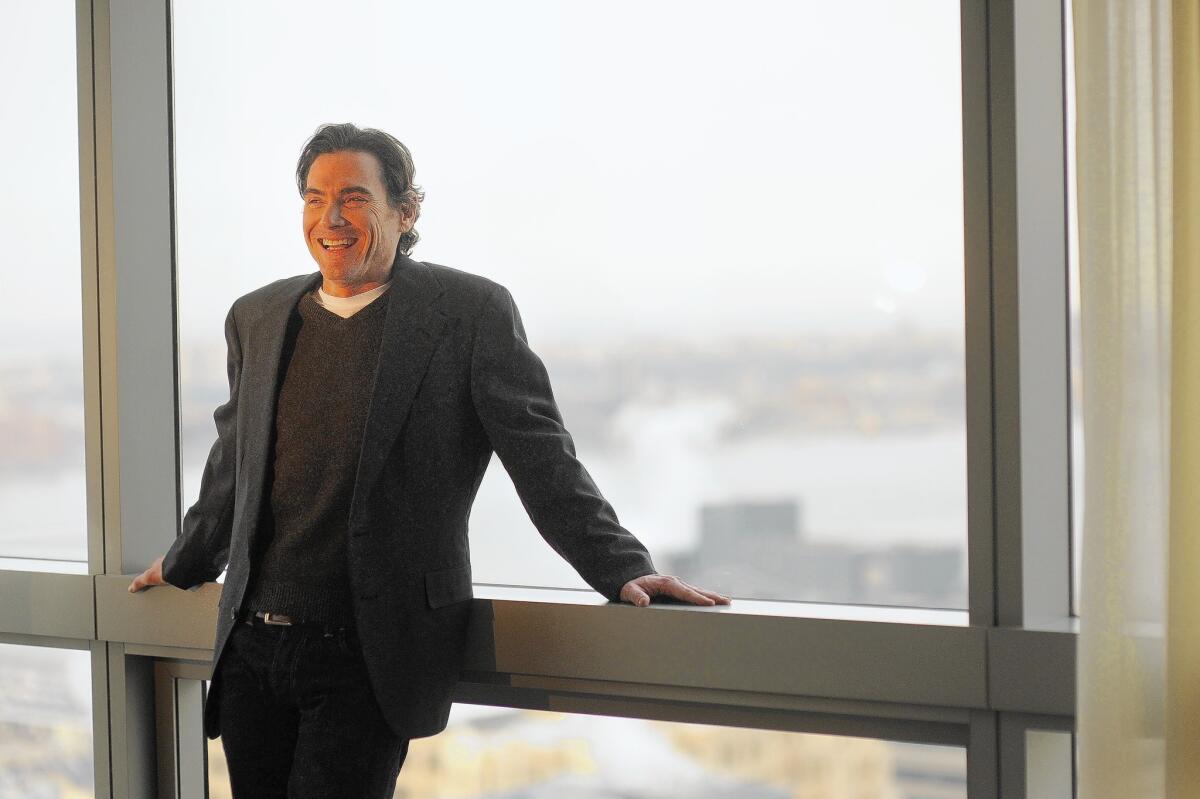Billy Crudup connects onstage, on-screen

Billy Crudup, 45, who played a charismatic ‘70s rock musician in Cameron Crowe’s 2000 comedy “Almost Famous,” J. Edgar Hoover in Michael Mann’s 2009’s “Public Enemies” and the very blue superhero Dr. Manhattan in Zack Snyder’s 2009’s “Watchmen,” stars as a dedicated New York detective with an ex-con big brother in the new film “Blood Ties.”
The film opens March 21 in theaters and also debuts that day on VOD.
Set in the 1970s, the crime thriller revolves around the brutal and loving relationship between two vastly different brothers. Crudup’s Frank is a veteran of the New York City police force. Clive Owen’s Chris is the black sheep of the family — a charismatic, violent man who has just been released from prison after serving several years on a murder charge.
PHOTOS: The billion-dollar box office club
“Blood Ties” also marks the first American movie by French actor-filmmaker Guillaume Canet (“Tell No One”). Canet starred in “Rivals,” the 2008 French version of this story of feuding siblings.
Crudup, who has been a mainstay on the New York stage for nearly two decades and won a Tony Award in 2007 for Tom Stoppard’s “The Coast of Utopia,” is also appearing on Broadway with Ian McKellen, Patrick Stewart and Shuler Hensley in revivals of Samuel Beckett’s “Waiting for Godot” and Harold Pinter’s “No Man’s Land.”
He recently chatted over the phone before a performance about “Blood Ties” and his life in theater.
Because you have two brothers, I would imagine you were able to draw upon your experiences with them for “Blood Ties.”
It was no problem whatsoever for me to identify with the sibling struggle. My brothers and I grew up fighting like maniacs.
My older brother is a year and a half older and my younger brother is 3½ years younger. I am very familiar with taking it as far as you can get in a fight before someone gets really hurt. There were a couple of trips to the hospital where we pushed the edge one way or another. But all in all, we survived it pretty well.
BEST MOVIES OF 2013: Turan | Sharkey | Olsen
You and Clive capture the complex dynamic of brothers. Did you two spend a lot of time to get to know each other before filming began?
Guillaume made that a priority that we should be able to spend some time together to try to explore that level of comfort and familiarity.
What was that relationship like?
Frank adores his older brother in some ways and is desperate for his approval. He is reduced to a 7-year-old kid in the presence of his older brother.
Frank is a bit more hard-edged than characters you normally play in films.
I am often cast in more sensitive roles, so I was pretty stoked about playing a tough-guy cop. I brought my son to the set one day, the day I just happened to be breaking in a door so he could see that Dad wasn’t always putting on makeup [for stage roles].
What was it like working with Canet?
He had such reverence for the style of film he was making — all the cop dramas of the ‘70s were so influential to him. It’s an interesting and familiar cinematic narrative — close family members on opposite sides who are forced into some conflict toward the end of the movie. I think Guillaume did an excellent job trying to navigate such a familiar [story]. He has an incredible appetite and ambition.
PHOTOS: Hollywood stars on stage
To make an American film in New York was such an important experience for him, but it was difficult at the same time because he hadn’t directed in English before and hadn’t worked in America. There was a different set of rules.
Appearing with Ian McKellen and Patrick Stewart nightly on Broadway must be a dream acting job.
There is no question. It must have been a year ago now when I got the call. I had worked with the director [Sean Mathias] once before. He had directed me in a production of “The Elephant Man” and I had a really great experience working with him. So when they said they were interested in me for this, all I could really think to ask them was “Why wouldn’t I do it?”
It’s an exotic experience, that’s for sure. I have had some really phenomenal opportunities both in theater and film and this one certainly ranks among the top.
A lot of theater actors seem to abandon the stage once they begin making movies, like Marlon Brando, who never did another Broadway show after “A Streetcar Named Desire.” But you seem to have struck a healthy balance between theater and film work.
The fact that I have been able to get an opportunity to do that has been really remarkable. I don’t know how to explain it. It has been a determined approach on my part to stay close to the theater scene in New York for my entire career. The fact of the matter is the greatest parts I am getting these days for sure are onstage, so I am lucky I have been able to maintain that connection.
More to Read
The biggest entertainment stories
Get our big stories about Hollywood, film, television, music, arts, culture and more right in your inbox as soon as they publish.
You may occasionally receive promotional content from the Los Angeles Times.











